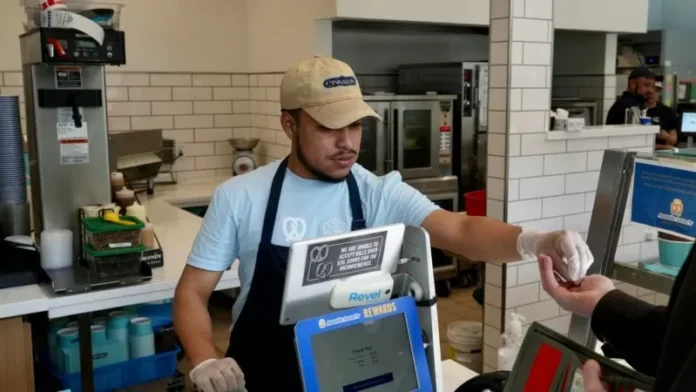LIVERMORE, Calif. – Starting Monday, fast food workers in California will see a significant increase in their pay as a new law goes into effect, providing more financial stability to a profession that has historically been known for its low wages. The new law, which will raise the minimum wage for fast food workers to $20 an hour, has been hailed as a major step towards providing better support for workers and their families, but has also raised concerns about potential price increases in a state already known for its high cost of living.
The law, passed by Democrats in the state Legislature last year, is a recognition of the fact that many of the over 500,000 people who work in fast food restaurants are not just teenagers earning pocket money, but adults who rely on these jobs to support themselves and their families. This includes immigrants like Ingrid Vilorio, who arrived in the United States in 2019 and started working at a McDonald’s shortly after. Fast food was her full-time job until last year, when she had to take on multiple jobs to make ends meet.
Vilorio, speaking through a translator, expressed her gratitude for the $20 raise, saying, “I wish this had come sooner because I wouldn’t have had to look for so many other jobs in different places.” Her sentiments are shared by many other fast food workers who have been struggling to make ends meet on minimum wage.
The law has received support from the trade association representing fast food franchise owners, who see it as a positive step towards providing better wages and benefits for their employees. However, since its passage, many franchise owners have expressed concerns about the impact it will have on their businesses, especially in the current economic climate.
Alex Johnson, who owns 10 Auntie Anne’s Pretzels and Cinnabon restaurants in the San Francisco Bay Area, says that sales have slowed down in 2024, forcing him to lay off his office staff and rely on his parents to help with payroll and human resources. The increase in wages will cost Johnson about $470,000 each year, and he will have to raise prices by 5% to 15% at his stores. He also stated that he is no longer hiring or seeking to open new locations in California due to the financial strain caused by the law.
“I try to do right by my employees and pay them as much as I can, but this law is really hitting our operations hard,” Johnson said. “I have to consider selling and even closing my business because the profit margin has become too slim when you factor in all the other expenses that are also going up.”
However, data from the past decade has shown that increasing the minimum wage has not led to job losses as feared. In fact, wages have gone up and employment has remained stable, according to Michael Reich, a labor economics professor at the University of California-Berkeley. He stated, “I was surprised at how little, or how difficult it was to find disemployment effects. If anything, we find positive employment effects.”
Moreover, while the statewide minimum wage is currently $16 per hour, many of the state’s larger cities have their own minimum wage laws that set the rate even higher. This means that for many fast food restaurants, the jump to $20 per hour will not be as significant.
The law is a result of a carefully crafted compromise between the fast food industry and labor unions, who have been at odds over wages, benefits, and legal liabilities for nearly two years. The law originated during private negotiations between unions and the industry, including the unusual step of signing confidentiality agreements.
The law applies to restaurants that offer limited or no table service and are part of a national chain with at least 60 establishments nationwide. Restaurants operating inside a grocery establishment are exempt, as are restaurants that produce and sell bread as a stand-alone menu item.
There was some confusion initially about whether the bread exemption applied to Panera Bread restaurants. Bloomberg News reported that the change would benefit Greg Flynn, a wealthy campaign donor to Governor Newsom. However, the Newsom administration clarified that the wage increase law does apply to Panera Bread because the restaurant does not make dough on-site. Flynn has also announced that he will pay his workers at least $20 per hour.
The new law is a significant step towards providing better wages and financial security for fast food workers in California. It is a recognition of their hard work and the important role they play in the state’s economy

